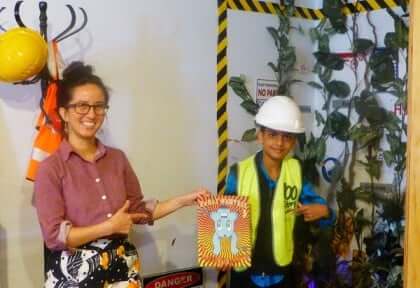Meet Taksh Patel, a 10-year-old writer who edited Early Harvest in 2016, a children’s literary journal
Taksh Patel is a writer. He is telling me about a story he has written, reciting the plot without hesitation. It’s a murder mystery, with a witch and a detective.
“His favourite hobby is reading,” says his mother, Sarika. “That’s why he wanted to come here.”

‘Here’, is 100 Story Building in Footscray, a space filled with books, framed manuscripts, collages, and a wacky construction site – a place that I would frankly have wanted to live in when I was bookworm child with a head full of weird imaginings (I once wrote a story set in a primary school called Pasturised Butter Primary. Go figure).
100 Story Building (there really are 100 Storeys…I mean, ahem, Stories) is a centre for young writers in Melbourne’s inner-west, running after-school activities, publishing programs, and creative storytelling excursions for young people from culturally and linguistically diverse and marginalised backgrounds.
Taksh is also an editor. The Patels migrated to Australia from Gujarat in 2012 and Taksh, now in Year 6, was selected to be an editor for the 2016 edition of Early Harvest, 100 Story’s yearly literary journal. This unique editorial board of upper-primary school children, with advice from publishing professionals, produced the magazine in its entirety, from inviting and selecting submissions, and commissioning artwork, to editing stories and creating briefs.

Jessica Tran, co-founder and Development Manager of 100 Story, describes their activities as encouraging young people to “take creative risks”. This strikes me as something everyone – young people and adults – should learn to do, and she agrees, saying that 100 Story’s adult facilitators have to be willing to do exactly that themselves as well, take the risks alongside their young charges. “Otherwise, it’s very difficult to teach!”
100 Story’s conscious reaching out to young people and parents who wouldn’t normally have access to creative workshops and writing and publishing opportunities is also an important part of its vision and mission.
As Jessica points out, research shows that in the world we live in now, literacy and creativity are important skills in their own right, skills that help people “become the best version of themselves”. “It’s not about everyone seeing creativity the way we do…but showing parents how creativity will help their child,” she says.
Sarika Patel sees writing, reading and creativity in the same way, as important life skills for her son. “You can’t just do one thing. Everything is important,” she says firmly.

100 Story is also an opportunity for children of CALD backgrounds to come together, and to have their own creative voices heard and respected, in a world where, as Jessica muses, they still don’t see much of themselves, even in books for young people. “And we are saying, no, you don’t have to keep seeing this world reflected back at you that doesn’t include you.”
As I finish speaking with Taksh, I have an absurd urge to prise something ‘profound’ about creativity from him, despite his age and understandable eagerness to get back to the group. So I ask him whether he thinks creativity is important for everyone. And I get back a devastatingly honest, unvarnished answer that gets to the heart of what 100 Story is about for him: “For people who like reading and writing it would be important.”
This is, after all, a place where kids who love to read, write or create in some way, get to unleash their imaginations, go on a storytelling adventure, and be themselves.
Perhaps, indeed, the best version of themselves.
www.100storybuilding.org.au





